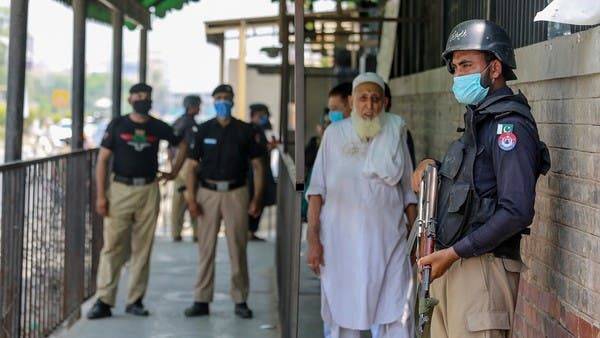
Two days ago, in a shocking development, a person accused of blasphemy was shot inside the highly secured zone of the Peshawar High Court. According to the original FIR, which was lodged against the deceased in 2018, he was an Ahmadi and had committed blasphemy and furthermore had claimed to be a Prophet. At the time of his death, his trial under 295 C was in process in the Peshawer High Court.
The killing has sent shockwaves as the accused was killed while under custody and in a highly secure zone. This episode has once again propelled Pakistan’s infamous blasphemy laws into the spotlight. Besides that, it has also highlighted the increasingly marginalized status of Ahmadis and most importantly, the aftermaths of the killing have also revealed a very sinister collective mindset of the general public.
First, regarding Pakistan’s blasphemy law, this killing has once again dispelled the often-touted logic that the law, acts a safety valve and “protects” the accused by giving them access to legal process. . In fact, if anything, this law gives a certain sense of entitlement to the killers to act in order to deliver “justice”. Once someone is booked under this law and the case gains even minor media attention, in wider public imagination the accused is simply assumed guilty. Since the public trust in the judicial system is supposedly low, therefore some are ready to take law into their own hands as they think judiciary won’t impart “justice”. Apart from that, since blasphemy is a nonbailable offense in Pakistan, the law is often used to settle personal scores.
In this case, however there is some video evidence that the accused had claimed to be a Prophet, therefore in “technical “ sense he was guilty. However, it is also pretty clear from the manner of his speech in the video that he was not of sane mind. In any case no sane person would claim to be a Prophet on video knowing Pakistan’s extremely harsh laws. The accused who was an aged person needed medical help but the way our blasphemy laws are designed, he was simply arrested irrespective of his state of mind.
Moreover, since the blasphemy law is in the spotlight therefore once more questions are being raised on its mechanism and severity. For the sake of perspective, there are around 50 Muslim majority countries and only a handful of states- Iran, Pakistan, Afghanistan, Brunei, Mauritania and Saudi Arabia-award death penalty to individuals accused of blasphemy. Among those countries where blasphemy is punishable to any extent, Pakistan and Iran have the most severe laws. While the case of Iran is still somewhat understandable as it is officially a theocracy, Pakistan’s laws are way out of line when compared to the rest of the democratic Muslim countries. The very fact that there is such a divergence between Pakistan and other Muslim countries means that there is no universal consensus among the Muslim world as to whether blasphemy should be punishable be death. In fact, Pakistan is an exception to the norm. Besides that some religious scholars, such as Javed Ahmed Ghamidi are also of the opinion that current blasphemy law is not based on Quran, Sunnah or Fiqh.
Second, this incident has once again put Pakistan’s already marginalized Ahamadi community in the negative spotlight. The fact that the accused was born as an Ahmadi – as per statement from Ahmadi Jamaat he later left the faith- has been once again used to incite virulent hatred against the entire community. On Twitter trends like #QadiyaniKafir are making rounds, spewing venom against the community. This incident has further intertwined blasphemy and Ahmadis in the collective public imagination and on social media there are open calls for them to be given capital punishment.
Third, and perhaps the most worrisome aspect of this incident is the way the killer is being hailed as a hero. On twitter trends like #GhaziKhalid and #GhaziTheLionOfIslam are dominating and many tweets under these hashtags are glorifying the killer in extraordinary ways. Within two days, the killer, a young man of hardy twenty, has attained a legendary status.
This raises two alarming and interrelated points. First, we as a society have become extremely intolerant and violence prone particularly when it comes to religion. Our heroes are those who kill in the name of religion and instead of condemning or feeling revulsion, we actually adulate them. It also shows that society’s criteria of wrong and right is seriously misplaced. Second, this kind of adulation, is going to further encourage more young men to kill in the name of religion as many would like to attain the same glorious status.
We have come to this stage because for decades we have cultivated the legend of individuals like Ilm-ud-Din, who had killed a Hindu for publishing blasphemous book. He has been glorified to that extent that to emulate him has become a “dream” of many religiously inclined individuals. In addition, extremely pervasive slogans like ““Hurmat-e-Rasool per Jaan be qurban hai” (for the honor of the Prophet (PBUH) we are ready to sacrifice our lives) actually expect that the honor of the Prophet (PBUH) should be protected even if one has to give their life. These slogans have a dangerous impact as these encourage violence in the name of respect for Prophet (PBUH).
In my opinion, nothing is going to change unless we change such narratives and try to reinterpret as to what respect for our Holy Prophet (PBUH) means. We need to teach our society that when we kill or act violently in the name of respect for Holy Prophet (PBUH), we are actually portraying his legacy in a wrong way. Real respect for our Prophet (PBUH) is shown when we act with kindness and empathy whereas acting violently in his name shows disrespect to his legacy of forgiveness and kindness. The world will try to judge our religion and our Prophet (PBUH) by the way we act in their name.
https://www.youtube.com/watch?v=ec5-bzvUUi8&t=164s
